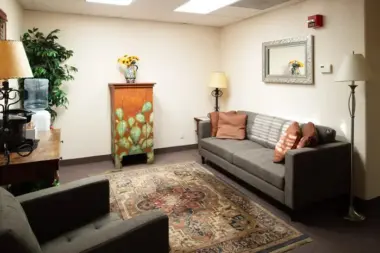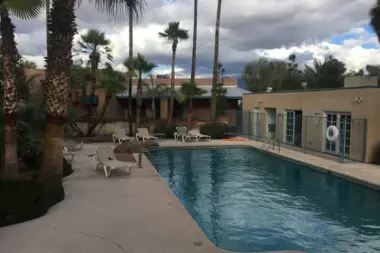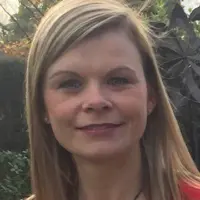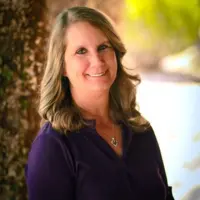I went here for treatment and I felt at peace. It was a life-changing experience, they have an excellent program and great staff.
About Cottonwood Tucson
They offer holistic detox, called Acudetox. This is a natural detox using acupuncture of the ear. It’s said to lower stress, reduce cravings and decrease anxiety. It also helps with physical and mental stability and focus.
The residential treatment program uses a plethora of treatment modalities to help you recover your authentic self. Most people stay in the inpatient program for about six weeks. They use individual and group therapy as well as brainspotting, psychodrama, and 12 Step meetings. Expressive arts groups and holistic wellness education are also part of the therapy experience.
If you’re diagnosed with post traumatic stress disorder (PTSD), they offer somatic experiencing. This is an alternative therapy wherein the therapist leads you to focus on sensations in your body to discharge the energy of past traumatic events. Then you work on using pleasant sensations, happy memories and thoughts of supportive loved ones to create feelings of security to work through the trauma.
The center also offers a partial hospitalization program (PHP) and an intensive outpatient program (IOP). There’s also a virtual IOP if you need more flexibility. The virtual IOP is Monday, Tuesday and Thursday evenings from 5:30 to 8:30. It lasts up to 12 weeks and uses evidence based therapies such as cognitive behavioral therapy (CBT). You must be 18, have a diagnosed mental health or substance use disorder and be free of homicidal or suicidal ideation to attend.
The PHP and IOP help prevent relapse, offer insight into your addiction and mental health and increase your communication and anger management skills. You’ll attend lectures, process groups and codependency recovery. You’ll also work on better coping skills and managing any self defeating behaviors.
Latest Reviews
Rehab Score
Gallery








Accepted Insurance
Other Forms of Payment
Private insurance refers to any kind of healthcare coverage that isn't from the state or federal government. This includes individual and family plans offered by an employer or purchased from the Insurance Marketplace. Every plan will have different requirements and out of pocket costs so be sure to get the full details before you start treatment.
Self-pay involves paying for treatment out of your own pocket. You can use savings or credit, get a personal loan, or receive help from family and friends to fund your treatment. If you don't have insurance or your insurance plan doesn't cover a specific program, self-pay can help ensure you still get the care you need.
Addiction Treatments
Levels of Care
Many clients who enroll in an outpatient rehab program are exiting intensive inpatient care and no longer require such high-level clinical supervision. Outpatient programs typically follow a step-down structure, with treatment frequency and intensity decreasing as clients progress in their recovery journey. Partial hospitalization (PHP) and intensive outpatient (IOP) levels of care are the most time-intensive and are designed primarily for clients who have just left inpatient treatment or who are at an elevated risk of relapse.
Intensive inpatient programs (IOP) offer high-level support for clients in early recovery, those exiting detox or inpatient rehabs, and those at an elevated risk of relapse. Intensive outpatient treatment typically includes rigorous individual, group, and family counseling. Evidence-based complementary therapies, such as acupuncture and massage, are widely available. Medication assisted treatment (MAT) may be provided. Clients in IOP receive a minimum of nine hours of treatment per week but may engage in up to 20 treatment hours weekly.
12-step programs are addiction recovery models based on Alcoholics Anonymous (AA). A number of substance abuse programs (including some drug and alcohol rehab centers) use the 12 steps as a basis for treatment. Beginning steps involve admitting powerlessness over the addiction and creating a spiritual basis for recovery. Middle steps including making direct amends to those who've been hurt by the addiction, and the final step is to assist others in addiction recovery in the same way. 12-Step offshoots including Narcotics Anonymous (NA), Cocaine Anonymous (CA), Dual Recovery Anonymous (DRA), Sex & Love Addicts Anonymous (SLAA) and Gamblers Anonymous (GA). At Cottonwood patients are encouraged to attend 12-step meetings in order to support overall recovery from addictive processes such as substance use disorders, eating disorders, compulsive gambling or destructive relationship patterns. Cottonwood offers individuals the opportunity to attend 12-step meetings on campus as well as in the community. Community based 12-step meetings allow individuals to gain the confidence and experience of accessing this valuable resource in a format that might replicate those meetings in their own home environment. Individuals learn how to obtain sponsorship and how to share within the structure of a 12-step meeting. This provides them with the foundation to comfortably access similar meetings as part of their aftercare plan.
A partial hospitalization program (PHP) offers a short-term alternative to inpatient treatment or a step-down option after a residential program. With PHP treatment, you'll receive 6 to 8 hours of daily support, up to 5 days a week. The duration of a partial hospitalization program can vary with the average length being 90 days. While commuting is necessary, some programs also offer telehealth options. PHP treatment is often covered by insurance and typically offers medication management, relapse prevention techniques, and behavioral therapy.
The initial phase of recovery treatment typically includes 24-hour clinical care in Arizona. This constant supervision ensures a safe detox process, which helps the individual physically stabilize from substance use. Patients will receive medications to curb withdrawal symptoms and cravings, as well as other necessary medical treatment. This period typically lasts up to a week, then the individual will receive medical clearance to begin inpatient or outpatient rehab.
Drug and alcohol addiction often takes a heavy toll on one's body. Over time, a physical dependence can develop, meaning the body physiologically needs the substance to function. Detox is the process of removing drugs and/or alcohol from the body, a process that can be lethal if mismanaged. Medical detox is done by licensed medical professionals who monitor vital signs and keep you safe, healthy, and as comfortable as possible as you go through detox and withdrawal.
Treatments
The goal of treatment for alcoholism is abstinence. Those with poor social support, poor motivation, or psychiatric disorders tend to relapse within a few years of treatment. For these people, success is measured by longer periods of abstinence, reduced use of alcohol, better health, and improved social functioning. Recovery and Maintenance are usually based on 12 step programs and AA meetings.
Drug rehab in Arizona is the process of treating individuals who are dependent on a particular addictive drug. Because addiction is complex, this treatment typically includes a variety of interventions that address the many physical and emotional issues involved.
Many of those suffering from addiction also suffer from mental or emotional illnesses like schizophrenia, bipolar disorder, depression, or anxiety disorders. Rehab and other substance abuse facilities treating those with a dual diagnosis or co-occurring disorder administer psychiatric treatment to address the person’s mental health issue in addition to drug and alcohol rehabilitation. Cottonwood’s co-occurring disorders program has proven to have a positive effect on preventing relapse after drug and alcohol treatment. Cottonwood can also makes quick assessments of co-occurring disorders through Cottonwood Assessment Program (CAP), CAP is a 4 day intensive inpatient assessment program providing a comprehensive evaluation that will focus on the specific needs of the individual.
A combined mental health and substance abuse rehab has the staff and resources available to handle individuals with both mental health and substance abuse issues. It can be challenging to determine where a specific symptom stems from (a mental health issue or an issue related to substance abuse), so mental health and substance abuse professionals are helpful in detangling symptoms and keeping treatment on track.
Opioid rehabs specialize in supporting those recovering from opioid addiction. They treat those suffering from addiction to illegal opioids like heroin, as well as prescription drugs like oxycodone. These centers typically combine both physical as well as mental and emotional support to help stop addiction. Physical support often includes medical detox and subsequent medical support (including medication), and mental support includes in-depth therapy to address the underlying causes of addiction.
Programs
Adult rehab programs include therapies tailored to each client's specific needs, goals, and recovery progress. They are tailored to the specific challenges adult clients may face, including family and work pressures and commitments. From inpatient and residential treatment to various levels of outpatient services, there are many options available. Some facilities also help adults work through co-occurring conditions, like anxiety, that can accompany addiction.
Recovery is most successful when clients feel accepted and validated by their peers and treatment providers. Facilities that offer LGBTQ-inclusive programming are committed to creating a safe space where everyone can grow and recover without fear of judgment or discrimination. They will have dedicated policies in place to create a safe and supportive environment that fosters free expression.
Serving in the military is both mentally and physically challenging, and can result in trauma that persists even after combat ends. Military programs are tailored to the specific and often complex needs of active duty personnel, veterans, and military families. Clients often access these programs through the U.S. Department of Veterans Affairs (VA).
Young adulthood can be an exciting, yet difficult, time of transition. Individuals in their late teens to mid-20s face unique stressors related to school, jobs, families, and social circles, which can lead to a rise in substance use. Rehab centers with dedicated young adult programs will include activities and amenities that cater to this age group, with an emphasis on specialized counseling, peer socialization, and ongoing aftercare.
Clinical Services
Cognitive Behavioral Therapy (CBT) is a therapy modality that focuses on the relationship between one's thoughts, feelings, and behaviors. It is used to establish and allow for healthy responses to thoughts and feelings (instead of unhealthy responses, like using drugs or alcohol). CBT has been proven effective for recovering addicts of all kinds, and is used to strengthen a patient's own self-awareness and ability to self-regulate. CBT allows individuals to monitor their own emotional state, become more adept at communicating with others, and manage stress without needing to engage in substance abuse.
Whether a marriage or other committed relationship, an intimate partnership is one of the most important aspects of a person's life. Drug and alcohol addiction affects both members of a couple in deep and meaningful ways, as does rehab and recovery. Couples therapy and other couples-focused treatment programs are significant parts of exploring triggers of addiction, as well as learning how to build healthy patterns to support ongoing sobriety.
Creativity is inherently healing, and can help those in recovery express thoughts or feelings they might not otherwise be able to. Creative arts therapy can include music, poetry/writing, painting, sculpting, dance, theater, sandplay, and more. Unlike traditional art, the final product matters far less than the experience of creation and expression itself.
Dialectical Behavior Therapy (DBT) is a modified form of Cognitive Behavioral Therapy (CBT), a treatment designed to help people understand and ultimately affect the relationship between their thoughts, feelings, and behaviors. DBT is often used for individuals who struggle with self-harm behaviors, such as self-mutilation (cutting) and suicidal thoughts, urges, or attempts. It has been proven clinically effective for those who struggle with out-of-control emotions and mental health illnesses like Borderline Personality Disorder.
Equine therapy, aka equine-assisted therapy (EAT), is a form of experiential therapy that involves interactions and activities with horses. It does not necessarily involve riding horses, but all activities related to horses, such as feeding, grooming, haltering and leading them. A mental health professional frequently oversees the activities (often in conjunction with a horse professional), and helps patients process their thoughts, feelings, and behavior patterns during and/or after the interaction.
Experiential therapy is a form of therapy in which clients are encouraged to surface and work through subconscious issues by engaging in real-time experiences. Experiential therapy departs from traditional “talk therapy” by involving the body, and having clients engage in activities, movements, and physical and emotional expression. This can involve role-play or using props (which can include other people). Experiential therapy can help people process trauma, memories, and emotion quickly, deeply, and in a lasting fashion, leading to substantial and impactful healing. Cottonwood offers a variety of experiential therapy groups. Experiential treatment modalities may include art therapy, drumming circles, movement therapy, labyrinth walks, psychodrama, or meditation. These groups provide a unique therapeutic framework for those individuals who may have difficulty identifying and expressing emotion or who may not have the ability to effectively communicate about painful life experiences such as trauma or loss. The venue of experiential therapy allows these individuals to tell their life story through a narrative of art, music, or movement. New insights gained in the context of experiential therapy are often integrated at a deeper level because they have been neurologically paired with a creative experience. Individuals may also be less defensive or guarded when participating in experiential therapy, thereby increasing their willingness to authentically explore personal issues such as addiction, depression, or trauma.
EMDR is a therapeutic modality originally developed to help process trauma. In an EMDR session, a patient is prompted to undergo eye movements that mimic those of REM sleep. This is accomplished by watching a therapist’s finger move back and forth across, or following a bar of light. The goal is repetitive sets of eye movements that help the brain reprocess memory, which can significantly reduce the intensity of remembered traumatic incidents. Associated memories can heal simultaneously, leaving patients significantly calmer, more stable, and more emotionally relaxed. At Cottonwood, EMDR is offered to individuals who struggle with symptoms of PTSD and unresolved trauma. EMDR is provided in individual sessions and is used in conjunction with other trauma treatment interventions. EMDR may focus on distress reduction, skill building, or resource development. An introduction to EMDR group is offered for patients who want to learn more about these resources before beginning EMDR sessions.
Research clearly demonstrates that recovery is far more successful and sustainable when loved ones like family members participate in rehab and substance abuse treatment. Genetic factors may be at play when it comes to drug and alcohol addiction, as well as mental health issues. Family dynamics often play a critical role in addiction triggers, and if properly educated, family members can be a strong source of support when it comes to rehabilitation. The Family Program is based on the theory that all behaviors are logical and learned. Family Program is designed to shift an unhealthy set of logical behaviors to a healthy set of logical behaviors: to create new patterns of behavior that allow for the recovery of the family and its loved one. The goal of Family Program is to create a shift toward a new way of interacting that is more useful than were the old patterns. The remarkable achievement of family week is that this shift is created in five days. Family week uses four core elements to create this shift: Education, Communication Training, Communication Enactment, and Multiple Family Group Support. When the family members are of an adolescent patient, the education extends to include Parenting and Adolescent Development. For all families, individual needs for private sessions or specific educational needs to address the loved one’s return to the family environment are met.
Group therapy is any therapeutic work that happens in a group (not one-on-one). There are a number of different group therapy modalities, including support groups, experiential therapy, psycho-education, and more. Group therapy involves treatment as well as processing interaction between group members. Cottonwood Tucson believes in the clinical efficacy of group therapy. Group therapy provides a nurturing, safe, and supportive environment in which individuals can begin to examine self-destructive behaviors, relationship patterns and negative beliefs that preclude them from fully participating in a recovery lifestyle. Individuals are assigned a primary group, facilitated by a Master level clinician, and consisting of other members in various stages of treatment at Cottonwood. Primary group therapy provides significant opportunity for connection with other group members in order to increase interpersonal insight, develop coping mechanisms, and address unresolved issues of trauma, depression, and addiction.
In individual therapy, a patient meets one-on-one with a trained psychologist or counselor. Therapy is a pivotal part of effective substance abuse treatment, as it often covers root causes of addiction, including challenges faced by the patient in their social, family, and work/school life.
Life skills trainings involve all the skills a person must have in order to function successfully in the world. These include time management, career guidance, money management, and effective communication. Truly successful addiction recovery is based on the ability to not only live substance-free, but to thrive. Life skills teaches the practical necessities of functioning in society, which sets clients up for success in life, and therefore sobriety.
Motivational Interviewing (MI) is a clinical approach to helping people with substance abuse issues and other conditions shift behavior in positive ways. It is more goal-oriented than traditional psychotherapy, as MI counselors directly attempt to get clients to consider making behavioral change (rather than wait for them to come to conclusions themselves). Its primary purpose is to resolve ambivalence and help clients become able to make healthy choices freely.
Recreational therapy (aka therapeutic recreation) uses creative and fun activities to help with addiction recovery. Recreational therapists lead patients in entertaining and engaging activities like sports or games; art (drawing, painting, sculpture); drama, music, and dance; and/or community outings (field trips) to improve patients' physical, social, and emotional well-being.
Trauma therapy addresses traumatic incidents from a client's past that are likely affecting their present-day experience. Trauma is often one of the primary triggers and potential causes of addiction, and can stem from child sexual abuse, domestic violence, having a parent with a mental illness, losing one or both parents at a young age, teenage or adult sexual assault, or any number of other factors. The purpose of trauma therapy is to allow a patient to process trauma and move through and past it, with the help of trained and compassionate mental health professionals.
Amenities
-
Yoga Studio
-
Private Transportation
-
Hiking
-
Gym
Staff & Accreditations
Staff

Jennifer Stokes
Chief Executive Officer

Melissa Hetzel, LCSW
Chief Operations Officer

Aaron Wilson, MD
Chief Medical Officer

Tab W. Hoyt, MSN, FNP-C
Chief of Medical Services & Nurse Practitioner

Maria Broz, RN, BA
Chief Nursing Officer

Mark Pargas
Director of Human Resources

Ken Naig
Director of Plant Operations

Maria Broz
Chief Nursing Officer

Lisa Cook
Director of Risk Management
Accreditations

The Commission on Accreditation of Rehabilitation Facilities (CARF) is a non-profit organization that specifically accredits rehab organizations. Founded in 1966, CARF's, mission is to help service providers like rehab facilities maintain high standards of care.
CARF Accreditation: Yes
Accreditation Number: 75216

LegitScript has reviewed Cottonwood Tucson as part of their certification program, and has determined that it meets the LegitScript standards for legality, safety and transparency.
LegitScript verified in
Contact Information
4110 West Sweetwater Drive
Building 1400
Tucson, AZ 85745



